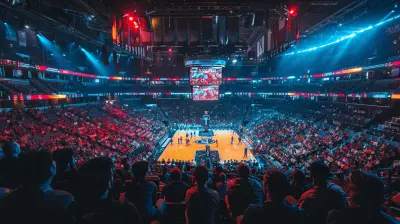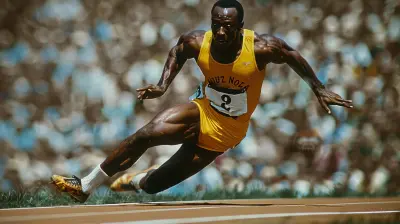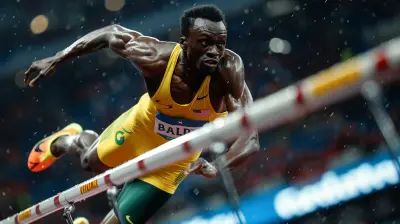13 March 2025
In professional sports, the term "MVP" (Most Valuable Player) is more than just a title. It’s a badge of honor that signifies a player’s excellence, consistency, and impact on their team. But have you ever stopped to ask yourself, what exactly makes an MVP? How does one athlete rise above the rest to claim this prestigious title?
If you’re a sports fan—and I know you are, because you're here—winning MVP is like the Holy Grail. But what sets these players apart from others? Is it just about stats, or is there more to it? Let’s break it down and dig deep into what makes an MVP in pro sports. Whether you’re a die-hard fan or someone who just wants to win that next fantasy league, this guide has you covered.

The Tangibles: Stats, Stats, and More Stats
Alright, let’s start with the most obvious factor—statistics. Numbers don’t lie, right? Well, in the world of professional sports, they certainly don’t. When it comes to MVP voting, stats are often the first thing that experts and fans alike look at. But not all stats are created equal. Let’s break this down a little further.Points and Performance
For many sports, the most straightforward stat is points scored. In basketball, it’s about how many buckets you can drain. In football, it’s about touchdowns. In baseball, it’s about home runs and RBIs. You get the idea. The more a player contributes to the scoreboard, the more likely they are to be considered for MVP. It’s simple math.But here's the kicker (no pun intended): being the top scorer doesn’t always guarantee an MVP title. There’s a lot more to the story, and that’s where other stats come into play.
Efficiency and Advanced Metrics
Beyond the basic stats, we’re now in the age of advanced metrics—fancy numbers that tell the full story of a player’s contribution. For instance, in basketball, stats like Player Efficiency Rating (PER) and Win Shares give a clearer picture of a player’s overall impact. PER measures a player's per-minute production, while Win Shares estimate how many wins a player has contributed to their team.In football, you’ve got QBR (Quarterback Rating) and Yards Per Attempt for quarterbacks, while in baseball, WAR (Wins Above Replacement) is a popular tool to measure a player's overall value compared to a replacement-level player.
These advanced stats help separate the good players from the great ones. A player who scores a lot but takes too many shots or makes too many mistakes might not be as valuable as someone who plays a more efficient, team-oriented game.

Leadership: The Intangibles That Don’t Show Up on the Stat Sheet
Now, let’s move beyond the numbers. Being an MVP isn't just about filling up the stat sheet—it's also about leadership, and this is where things get a little more subjective.Locker Room Presence
You know that player who rallies the team during tough times or steps up when the chips are down? That’s an MVP. Leadership is an intangible quality that can’t be measured by numbers, but it’s often what sets great players apart. Think of players like LeBron James or Tom Brady—guys who elevate not just their own play, but the play of everyone around them.An MVP is often the one who takes on the big moments, whether it's through a game-winning shot, a last-second touchdown, or a clutch hit in the ninth inning. These players don't just perform—they inspire.
Mental Toughness
When you think of MVPs, you’re thinking of players who can handle pressure, plain and simple. In pro sports, there’s always a point where the stakes are high, and not everyone is built for that kind of pressure. MVPs are the ones who don’t fold under the weight of expectation. They thrive in those moments, showing resilience and mental toughness when it matters most.Ever heard of the phrase "clutch gene"? Yeah, that’s what we’re talking about here. The ability to rise to the occasion when the game is on the line is a key trait of any MVP.

Team Success: It’s Not Just About the Individual
Here’s something that often gets overlooked: MVPs are usually found on winning teams. It’s rare for a player on a losing team to win the award, and there’s a reason for that.Wins Matter
Team success is a huge factor in MVP voting. After all, how valuable can a player really be if their team is stuck at the bottom of the standings? Winning games—especially big ones—often becomes a crucial part of the MVP conversation. It’s about impacting wins. If your play directly leads to more victories, you’re naturally going to be in the MVP conversation.That’s not to say players from losing teams never win MVP, but it’s certainly much more difficult. Russell Westbrook won the NBA MVP in 2017, despite the Oklahoma City Thunder being a mid-tier playoff team. Why? Because he averaged a triple-double for the entire season—something that hadn’t been done in decades! It was an exceptional case, but it shows that individual brilliance can sometimes outweigh team performance.
Contribution to Success
Even if your team is winning, you need to be a key contributor to that success. If you're just along for the ride, you won't get much MVP attention. MVPs are game-changers—players who make all the difference when they’re on the field or court.Think about it like this: a team is a car, and the MVP is the engine. Sure, the car might have shiny rims, a fancy stereo, or a slick paint job, but without that engine, it’s not going anywhere.

The Narrative: The Story Behind the MVP
Here’s the wild card—the narrative. Every MVP season has a storyline, and that storyline often plays a massive role in the final decision. Sportswriters, fans, and even other players love a good story. The narrative can often sway voters in ways that stats and team success can’t.Overcoming Adversity
Everyone loves an underdog story. If a player has overcome personal or professional obstacles to reach the top, that’s often a huge factor in the MVP conversation. Injuries, team struggles, or even off-field issues can make a player’s success even more compelling.For example, Derrick Rose winning the NBA MVP in 2011 was as much about his incredible play as it was about his journey from growing up in a tough Chicago neighborhood to leading his hometown team to the top of the Eastern Conference.
Season of Historic or Record-Breaking Performances
Sometimes, the narrative is all about breaking records or doing something historic. Think about Steph Curry in 2016, when he became the first unanimous MVP in NBA history after leading the Warriors to a record 73-9 season. His individual brilliance was undeniable, but the narrative of transforming the game with his three-point shooting put him over the top.The “MVP Moment”
Every MVP season usually has a defining moment—a signature play or game that solidifies the player’s candidacy. Think of it as the exclamation point on an already impressive body of work. Whether it’s a walk-off home run, a buzzer-beater, or a last-second touchdown, these moments stick in the minds of fans and voters alike. It’s the kind of highlight that gets played over and over, sealing the player’s legacy.MVP in Different Sports: A Brief Comparison
Here’s the thing: the criteria for being an MVP can vary slightly depending on the sport. Let’s take a quick look at some of the differences.Basketball (NBA)
In the NBA, MVPs are typically high-scoring, do-it-all athletes who can also contribute with assists, rebounds, and defense. Think LeBron James, Michael Jordan, and Giannis Antetokounmpo. The narrative in basketball often revolves around versatility and being a leader on both ends of the court.Football (NFL)
In the NFL, MVPs are usually quarterbacks. Why? Because the QB has the ball in their hands on nearly every offensive play, and their decisions often dictate the outcome of the game. Players like Patrick Mahomes, Aaron Rodgers, and Peyton Manning have dominated MVP voting in recent years. That said, running backs occasionally sneak in—like Adrian Peterson in 2012—especially when they have a historic season.Baseball (MLB)
In baseball, MVPs can come from any position. However, the debate often centers around whether a player is more valuable offensively (i.e., hitting home runs) or defensively (i.e., being a Gold Glove-caliber fielder). Players like Mike Trout and Mookie Betts are examples of players who excel in both areas, making them perennial MVP candidates. Pitchers rarely win MVP, but it’s not unheard of—Clayton Kershaw did it in 2014.Conclusion: The Perfect Storm of Talent, Leadership, and Narrative
So, what makes an MVP? It’s a combination of factors—dominant stats, leadership, team success, and an unforgettable narrative. It's not just about being the best player; it's about being the most valuable player. When all these elements come together in perfect harmony, that’s when we see an MVP emerge.At the end of the day, being an MVP is about more than just numbers; it’s about impact. It’s about being the player that a team—and sometimes an entire league—can’t live without. So, the next time you watch your favorite sport, keep an eye out for that player who’s not just good, but irreplaceable. Chances are, you’re watching the next MVP.










Anabella Duke
MVPs excel in skill, impact, consistency, and leadership. Simple.
April 3, 2025 at 4:50 AM